

Royalty free music downloads. Adventures Great and Small - An adventure travel resource for the independent traveler. Intelligence quotient. IQ scores have been shown to be associated with such factors as morbidity and mortality,[2][3] parental social status,[4] and, to a substantial degree, biological parental IQ.
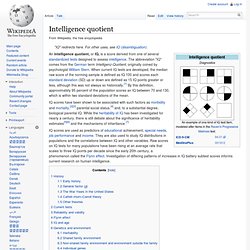
While the heritability of IQ has been investigated for nearly a century, there is still debate about the significance of heritability estimates[5][6] and the mechanisms of inheritance.[7] History[edit] Early history[edit] The English statistician Francis Galton made the first attempt at creating a standardised test for rating a person's intelligence. French psychologist Alfred Binet, together with Victor Henri and Théodore Simon had more success in 1905, when they published the Binet-Simon test in 1905, which focused on verbal abilities. Sun & Earth Applet. Day and Night World Map. +1 this page: Follow us on Google+: Like/share this page: Follow us on facebook:

BioDigital Human: Explore the Body in 3D! Electricity. Erratic Phenomena. Content » Blog Archive » 16th letter - epic. A couple of months back, I wrote a post about my love/hate relationship with Twitter.

In that article, I talked about what I see as being the big downfall of Twitter, which is that it is hard to quickly and easily get people using and understanding it. Twitter is hard to explain, there is no key selling proposition, people sign up and then leave, and the language of Twitter is hard to understand. But now I am starting to grasp what I think is the real reason that it’s so hard to catch onto Twitter – everyone uses it for something different. M. S. Subbulakshmi - Wikipedia, the free encyclopedia - epic. Madurai Shanmukhavadivu Subbulakshmi (Tamil: மதுரை சண்முகவடிவு சுப்புலட்சுமி, Madurai Shanmukhavadivu Subbulakshmi ?
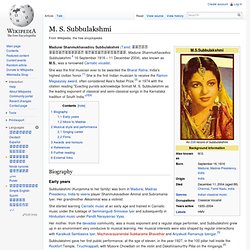
16 September 1916 – 11 December 2004), also known as M.S., was a renowned Carnatic vocalist. She was the first musician ever to be awarded the Bharat Ratna, India's highest civilian honor.[1] She is the first Indian musician to receive the Ramon Magsaysay award, often considered Asia's Nobel Prize,[2] in 1974 with the citation reading "Exacting purists acknowledge Srimati M. S. Fight Only For Freedom _.-Reversing Team-._ - epic. Pro Hack: Google - epic. Human. Humans began to practice sedentary agriculture about 12,000 years ago, domesticating plants and animals which allowed for the growth of civilization.
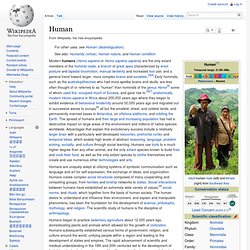
South Asian Stone Age. The South Asian Stone Age covers the Palaeolithic, Mesolithic and Neolithic periods in South Asia.
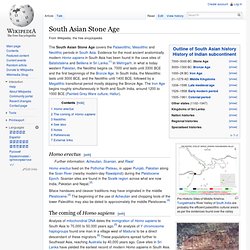
Evidence for the most ancient anatomically modern Homo sapiens in South Asia has been found in the cave sites of Batatotalena and Belilena in Sri Lanka.[1] In Mehrgarh, in what is today western Pakistan, the Neolithic begins ca. 7000 and lasts until 3300 BCE and the first beginnings of the Bronze Age. In South India, the Mesolithic lasts until 3000 BCE, and the Neolithic until 1400 BCE, followed by a Megalithic transitional period mostly skipping the Bronze Age. The Iron Age begins roughly simultaneously in North and South India, around 1200 to 1000 BCE (Painted Grey Ware culture, Hallur).
Pre Historic Sites of Middle Krishna-Tungabhadra River Valley of South India are probably the efficient paleolithic cultural area's as per the evidences found over the valley Homo erectus[edit] Biface handaxes and cleaver traditions may have originated in the middle Pleistocene. Neolithic[edit] Notes[edit] 10th millennium BC. The 10th millennium BC marks the beginning of the Mesolithic and Epipaleolithic period, which is the first part of the Holocene epoch.
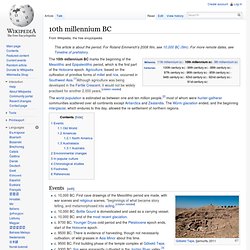
Agriculture, based on the cultivation of primitive forms of millet and rice, occurred in Southwest Asia.[1]Although agriculture was being developed in the Fertile Crescent, it would not be widely practised for another 2,000 years. [citation needed] Events[edit] Code of Hammurabi. The Code of Hammurabi is a well-preserved Babylonian law code of ancient Iraq, formerly Mesopotamia, dating back to about 1772 BC.
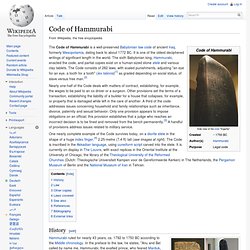
I'm sorry for the inconvenience? The Storyteller. Learn Something New Every Day. Most of us have one or two areas of knowledge that we strive to know very well — things related to our jobs, of course, and maybe a hobby or two.
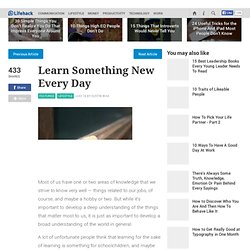
But while it’s important to develop a deep understanding of the things that matter most to us, it is just as important to develop a broad understanding of the world in general. A lot of unfortunate people think that learning for the sake of learning is something for schoolchildren, and maybe college students. All the things there are to learn and know that don’t impact directly on their immediate lives they dismiss as “trivia”.
Out in the “real world”, they think, there’s no time for such frivolities — there’s serious work to get done! There are a lot of good, practical reasons to make learning something new a part of your daily routine, but the best reason has nothing to do with practicality — we are learning creatures, and the lifelong practice of learning is what makes us humans and our lives worthwhile. Top 40 Useful Sites To Learn New Skills.